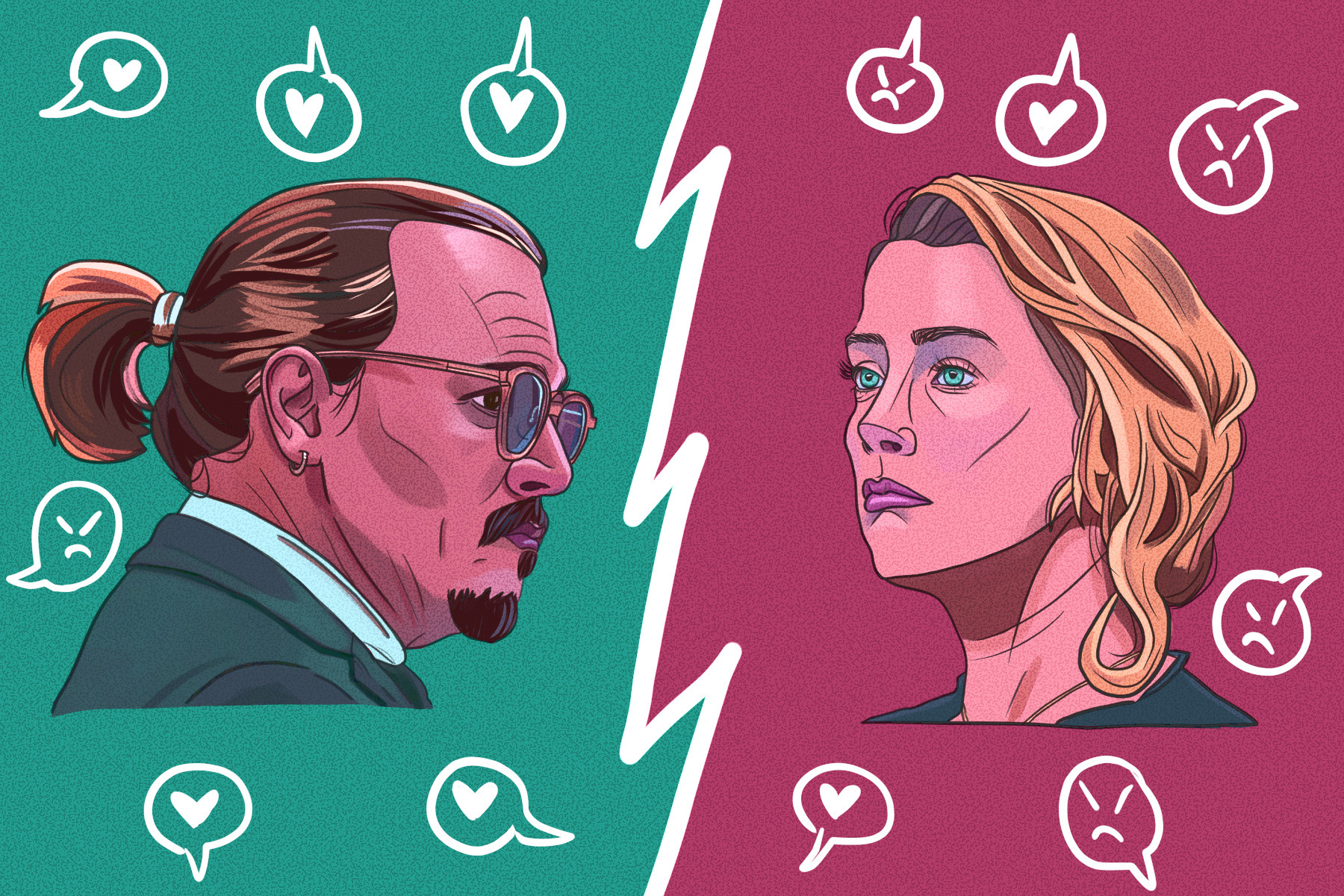High-profile lawsuits are staples of entertainment in the United States. Spawning tabloid drama and ensnaring personalities with a well-defined fanbase, legal proceedings involving celebrities always receive extensive press coverage.
The now resolved case involving former partners Johnny Depp and Amber Heard is the most recent iteration in the canon of glorified court cases that are pushed onto the public’s consciousness, yet its novel cultural impact alongside the polarizing narratives set it apart from all the rest. Most cases that are similar to Depp v. Heard are greatly sensationalized, with frivolous drama taking the center stage of public discourse, though none have become completely derailed by a public conversation in quite the same fashion as this one.
The specifics of Depp v. Heard are important, but they don’t reflect the spectacle of the trial on their own. Heard wrote an opinion piece in 2018 claiming to have been subjected to domestic abuse by a significant other who was subsequently identified as Depp. In the article, Heard wrote about the disadvantaged positions of female survivors of assault stating, “Men have the power — physically, socially and financially — and that a lot of institutions support that arrangement.”
Depp was removed from several upcoming cinematic projects following the piece’s publication, and he has consistently denied the claims. The adverse impact on his career prompted his lawyer to decry Heard’s allegations, prompting the actress to seek damages. The 2022 trial was a culmination of competing claims, yet the cultural environment brewing throughout the proceedings complicated the trajectory of the case’s resolution.
It wasn’t long before the attention of the public was misdirected toward points of shallow entertainment rather than the case’s substantive charges. Countless small moments of the testimony generated buzz on social media for ridiculous quotes or humorous revelations. One such portion of the proceeding entailed a lengthy and unintentional comedic characterization of Depp’s assertion that Heard had defecated in their shared bed.
Other segments of the trial were more overtly connected to defamation, such as the chaotic testimony from Dr. David Spiegel, whose amateurish statements couldn’t convince the jury that Depp’s actions indicated abuse. It did not help Heard’s case that many of the individuals called to the stand by her legal team were viewed with great skepticism due to their irregular testimonies. Viral moments such as the pre-recorded testimony of Heard’s doorman, who vaped and drove his car during the brief video message, overshadowed her own statements and frequently rendered her argument inert.
Social media platforms such as Instagram and TikTok heightened the focus on minute, humorous details because of their short-form video format — ideal for brief, absurd clips of the testimonies. The prevalence of the case as a popular topic on social media has motivated many prominent social media personalities to engage with the suit in shallow and often miscalculated ways. The TikTok account for the language learning platform Duolingo, which became popular in recent months for the short-form antics of its avian mascot, commented under a clip of Heard speaking in court, jokingly asking if the actress uses the app. Though the comment did not attack Heard in the manner that many others have, it became controversial for diminishing the severity of the suit to boost the popularity of Duolingo’s platform.
The poorly timed comment is only one example among a slew of opportunistic comedy made at Heard’s expense, and while these didn’t influence members of the jury or the legal parties involved, they do indicate the lack of focus on the severe accusations leveled in the proceedings.
Depp v. Heard is far from the first high-profile trial to be broadcast to the public. The O.J. Simpson case, which took place between 1994 and 1995, was regularly covered in print media and on most major television stations, subsequently becoming the most publicized legal case in American history and known for memorable moments that have come to define the public’s understanding of the case.
The trial was incredibly divisive along demographic lines, with public opinion surveys showing that African Americans agreed with the verdict that acquitted Simpson, while most white Americans did not. A similar gap has become clear with Depp v. Heard, wherein many male media figures have shown support for Depp while female commentators have sympathized with Heard. The Simpson case, though it dealt with radically different criminal charges, serves as a point of comparison for Depp v. Heard due to the size of media coverage the two received and the focus on vilifying the parties involved rather than objectively observing the outcome.
The gender gap and inflammatory rhetoric that has defined the Depp v. Heard case is clear in some of the more prominent coverage of the proceedings. Prolific podcast host Joe Rogan briefly commented on the verdict in an episode of his show on June 2, initially expressing sympathy for Heard’s emotionally taxing experience in the legal proceedings before wading into a momentary attack on her character. Punctuated by comedic misfiring, Rogan’s statement on the subject challenged the validity of her accusations and diminished her courage in speaking about the alleged misconduct. Rogan’s podcast is wildly popular online, and he wields an outsized voice when commenting on sensitive subjects like this trial. Duolingo’s gaffe might not have any influence on the public’s perception of the trial, but Rogan’s statement most certainly does.
It’s impossible to determine the degree of influence social media had over the verdict, but the discrepancy in damages roughly mirrors the levels of support that the respective actors received. Depp was awarded $10.4 million while Heard received only $2 million, an outcome that undoubtedly favors the former. The awarded amounts mirror the size of each actor’s fanbase, with the hashtag #justiceforjohnnydepp associated with 20 billion views on TikTok, while #justiceforamberheard has a mere 80 million.
These mobilizing campaigns ultimately have the greatest influence, for they separate Depp’s supporters from Heard’s, both of which view the trial through the prism of their fandom. The polarization of the trial in tandem with the insubstantial viral clips of the proceedings broke the public’s perception of a justice system that is ideally devoid of group mentalities. In a trial filled with shocking revelations, the greatest flaw revealed was the fragility of the public’s commitment to remaining grounded in objectivity.

















